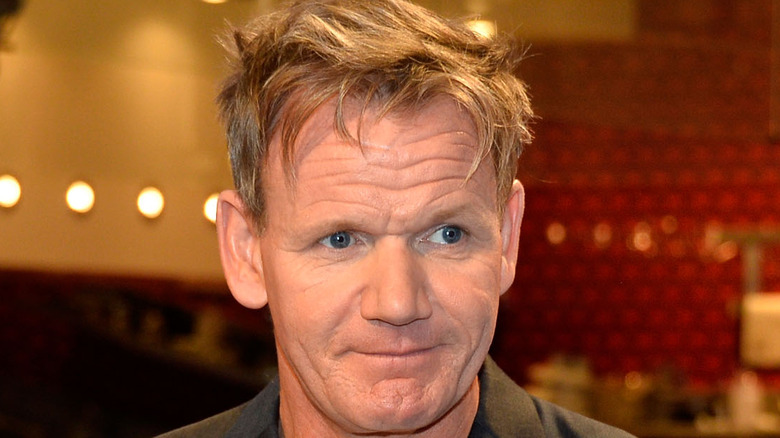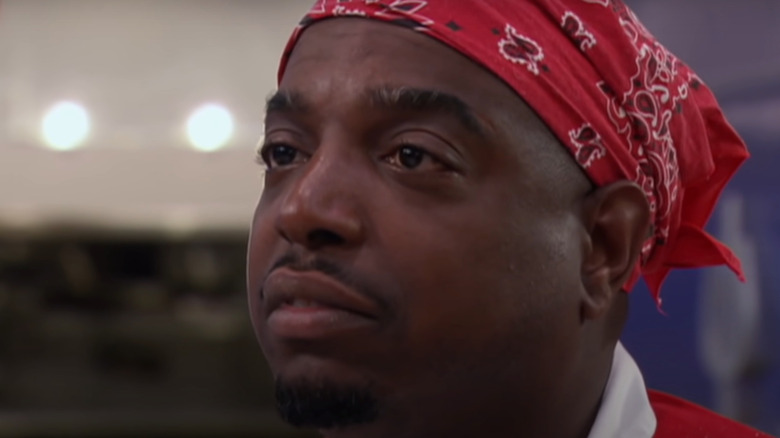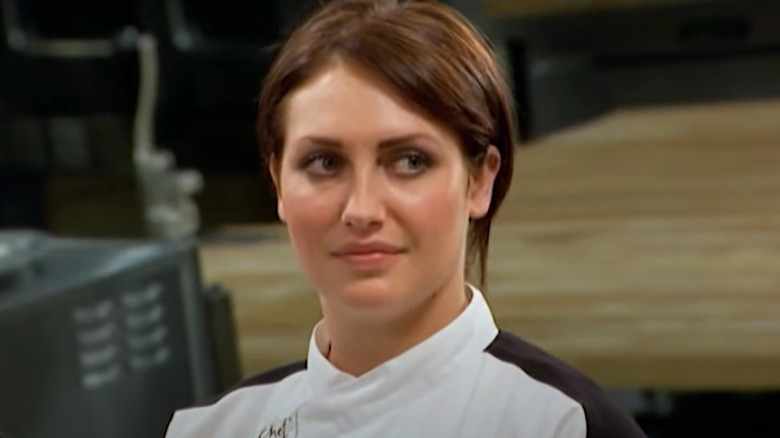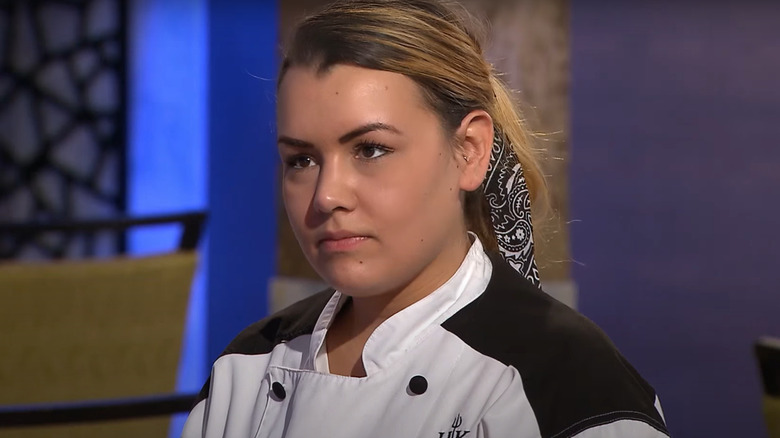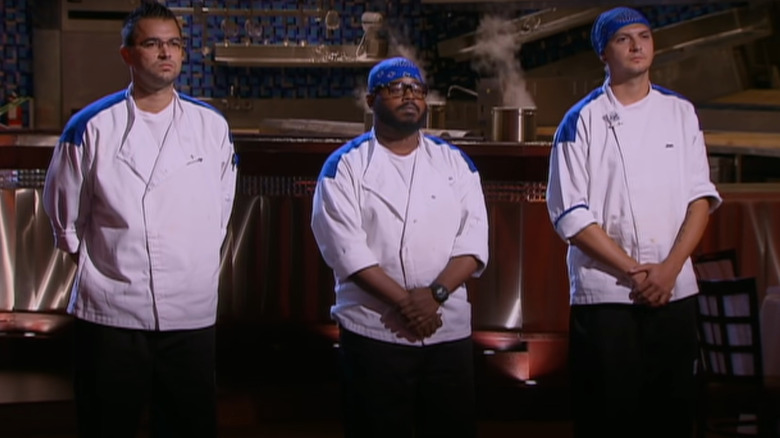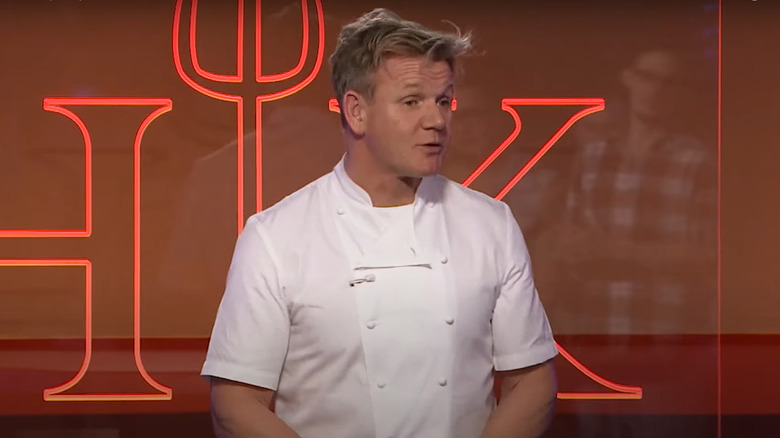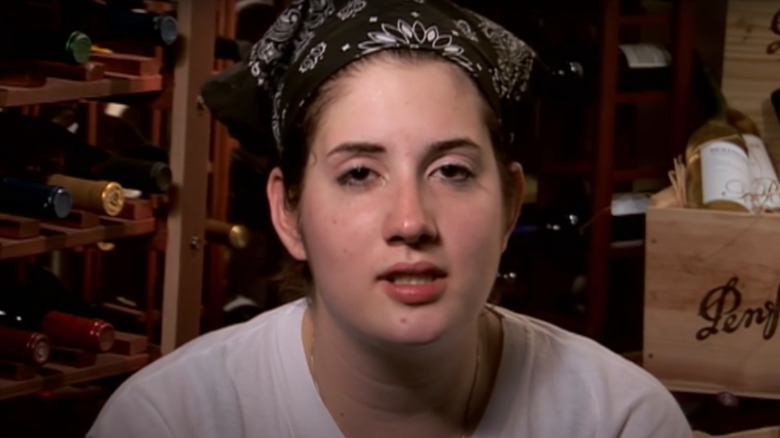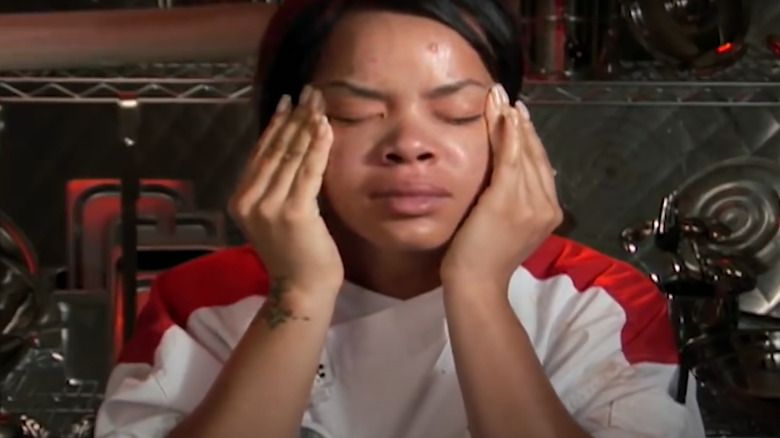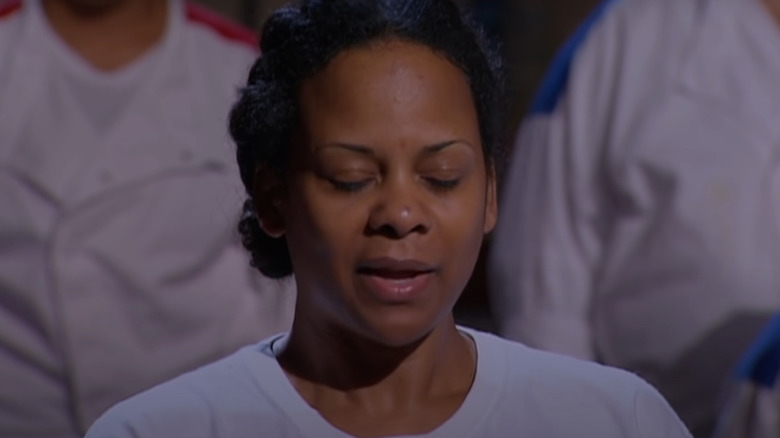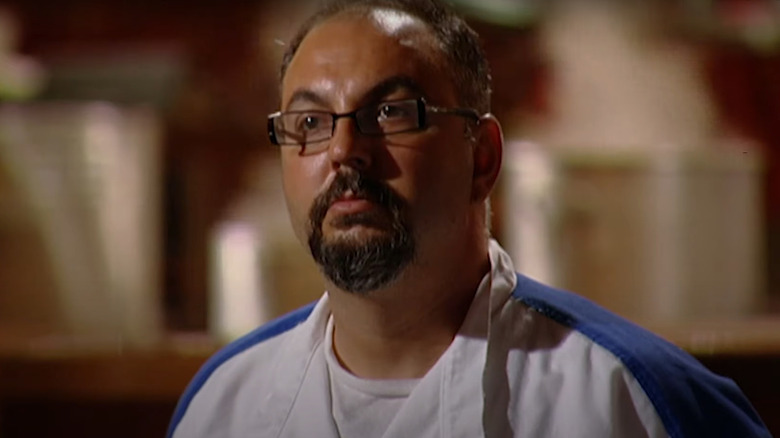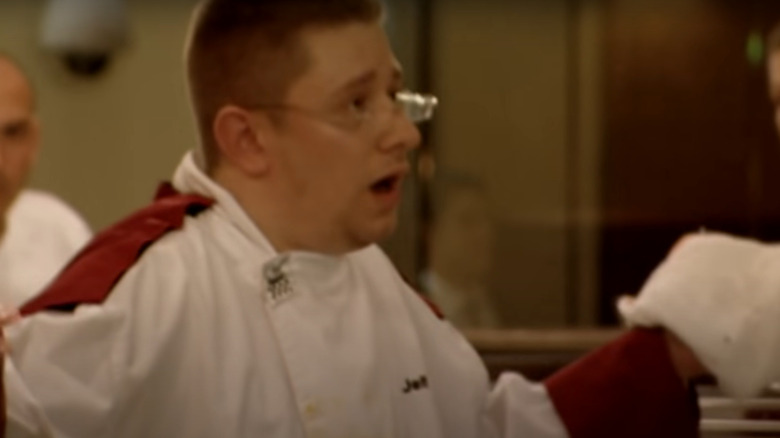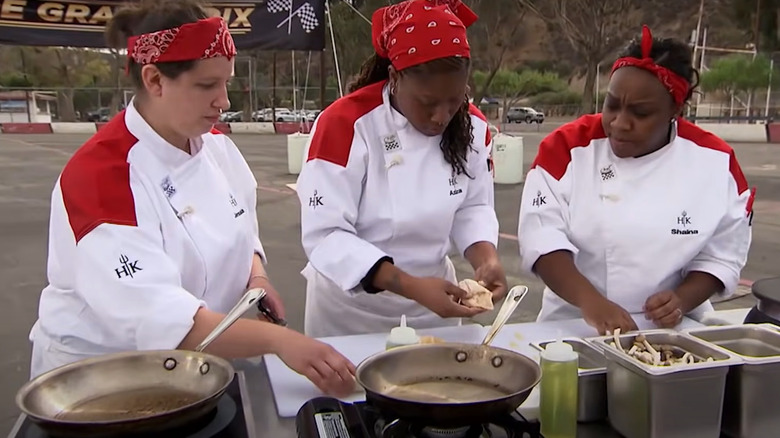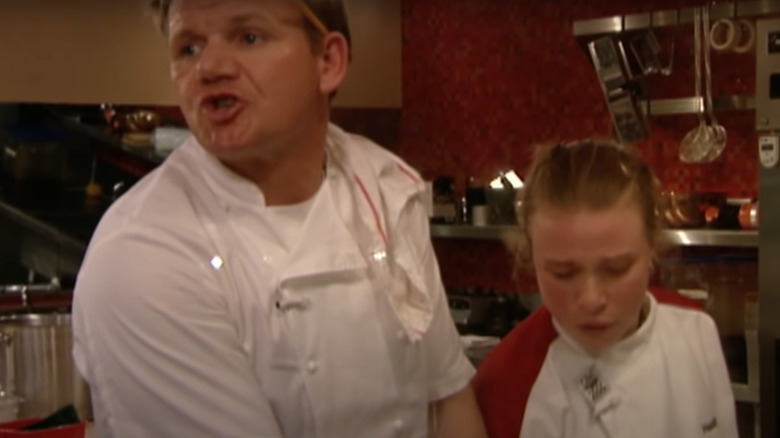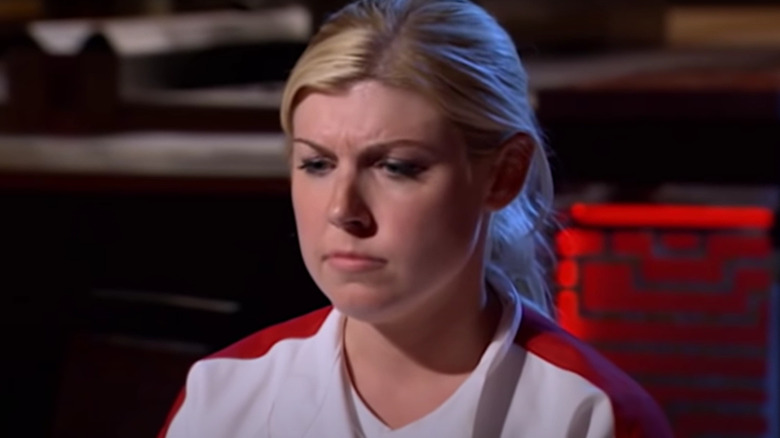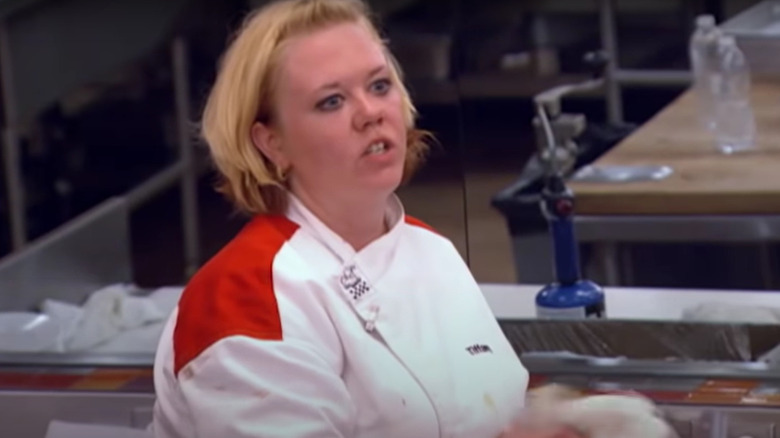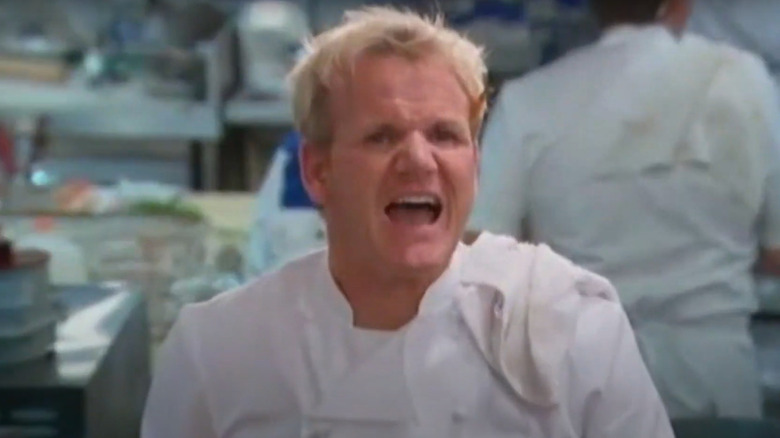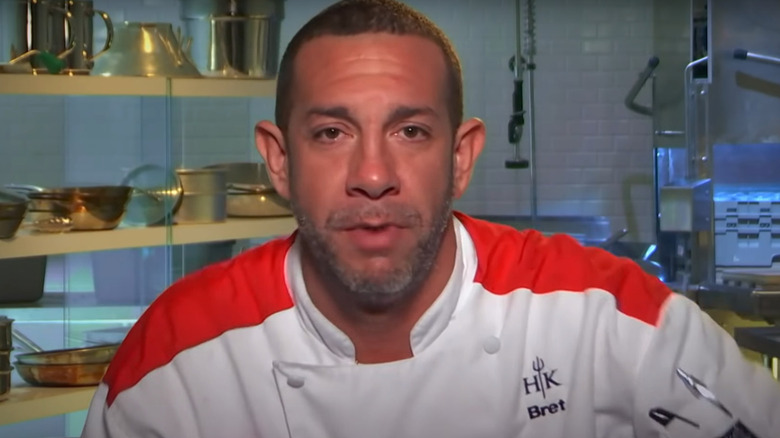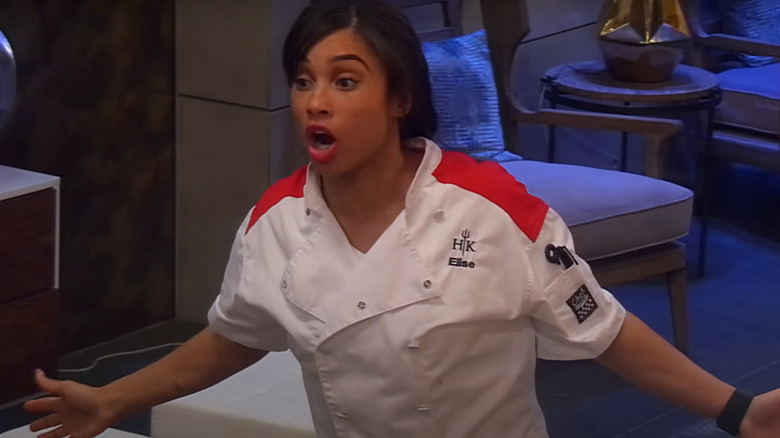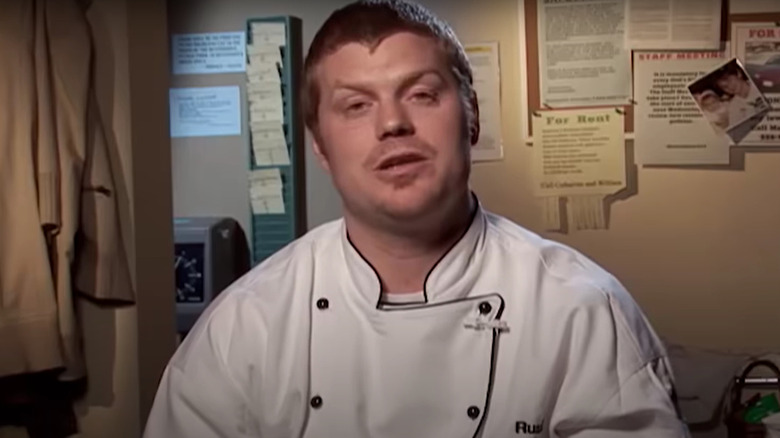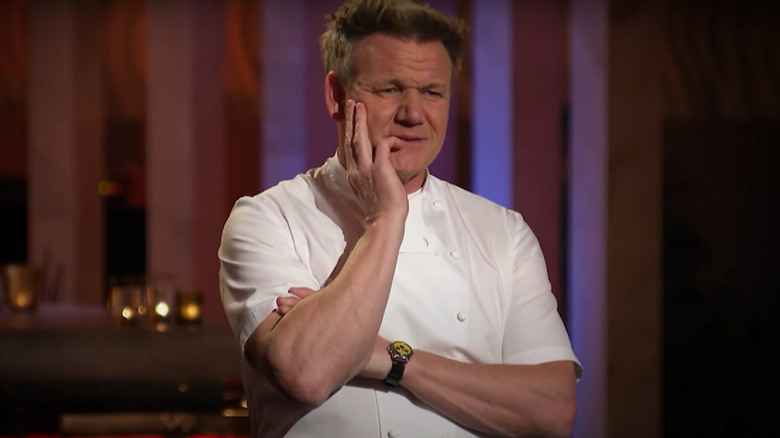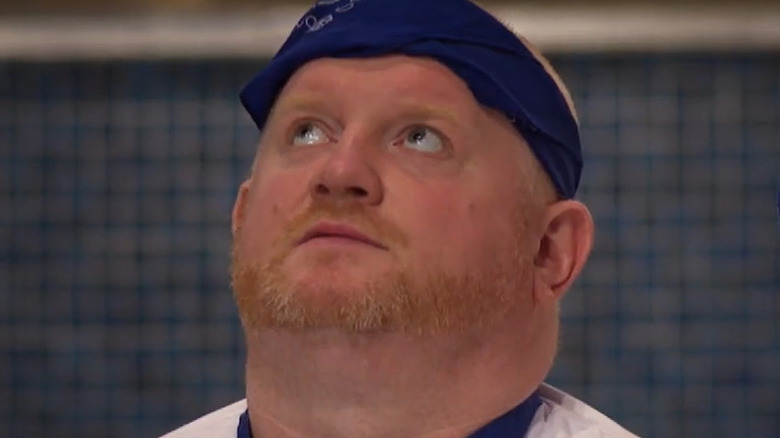Every Hell's Kitchen Season Ranked Worst To Best
"Hell's Kitchen" is one of the most deliciously addicting reality shows out there. From watching arrogant aspiring chefs crumble under the pressure of working on a long shift for the first time, to seeing the prep of world-class dishes, to the backstabbing drama of the show's contestants, there are so many elements of "Hell's Kitchen" that make for great entertainment. And of course, there's the internationally famous Gordon Ramsay, who never has a shortage of loud profanities and angry outbursts to subject the competitors to.
The show has been going strong for 20+ seasons. But because of the long history of "Hell's Kitchen," there were bound to be seasons that didn't deliver as much as the audience wanted. Some seasons had a lively cast of personalities and plenty of surprise twists that kept us coming back for more, while others floundered around with needless bickering between contestants and a lack of interesting challenges. And as fun as it is seeing Gordan freak out on chefs who fumble with even the most basic culinary tasks, it sometimes felt that he was ratcheting up the anger for no reason.
Here, we rank all of the seasons of "Hell's Kitchen" from worst to best. The scores included here are the average scores for each season from IMDb. So read on to relive the lows and highs of "Hell's Kitchen."
20. Season 13
First is the worst on this list, and Season 13 certainly qualifies for that dubious honor. Not only did the season lack an interesting group of competitors, the final black jacket group was weaker than usual. This season was also lacking in tension and drama, nor were there many surprises that shook the status quo of the show. All of this added up to a pretty unmemorable and lackluster season.
However, there were a few bright spots in the seasons — most notably that of Sterling Wright, whose boisterousness and enthusiasm added much to an otherwise underwhelming season. And while he only made it to seventh place, his personality was so endearing that he even impressed the stony Gordon Ramsay. Another minor bright spot in this season was the debut of maître d′ Marino Monferrato, who was a welcome addition to the show's regular cast.
19. Season 7
Season 7 of "Hell's Kitchen" has a few interesting moments: It is the only one where the red team lost every single dinner service, and is the first where two competitors were eliminated on the same night.
Other than that, the season doesn't have as much going for it. The petty bickering got to be too much at times, and Gordon Ramsay's profanity-laden shouting seemed more over-the-top than usual, going from entertaining to almost unbearable. Holli Ugalde was the winner of "Hell's Kitchen" this time around, who's remembered for little more than the vanity she displayed throughout the season (she even said "I'll play that cute factor. Let's put it this way: I'll work just as hard as everyone, but I'll look better doing it"). However, Holli wasn't able to become the head chef at Ramsay's Savoy Grill in London due to issues with her visa, making this season a bit of a waste.
18. Season 17
This season — officially called "Hell's Kitchen: All-Stars" — is notable for being the first season to consist entirely of previous competitors, bringing 16 former chefs who made it to the black jacket team in their respective seasons. In a "Hell's Kitchen" first, Gordon Ramsay picked three finalists instead of the usual two: Michelle Tribble, Benjamin Knack, and Nicholas "Nick" Peters Bond, with Michelle ultimately winning the grand prize. And let's not forget about the new black jackets that were introduced this season, as well.
While the idea of doing a season featuring only previous contestants is an interesting one, it didn't quite live up to its potential. The squabbles between competitors — which is usually quite fun to watch — felt forced, even staged, at times. Also, the joy of seeing returning chefs and getting attached to them was diminished by them getting eliminated again.
17. Season 11
Season 11 is one of the longest in "Hell's Kitchen" history, as it featured 22 episodes, as well as beginning the biggest cast of competitors at 20. A fun new change to the show was that its opening Signature Dish Challenge was conducted with a live audience, which meant that the more ... colorful ... personalities got a chance to shine in front of a crowd.
And because this season was so long, it meant that the flaws were more drawn out. This season saw the red team dominating the team challenges, winning 10 out of 12. However, the blue team's constant failures made the season flat and predictable. There was plenty of opportunity for Gordon Ramsay and the show's producers to shake things up a bit, but audiences were left with too many episodes that mostly repeated themselves.
16. Season 15
To give the competing chefs a taste of what the grand prize entails, this season kicked off with the Signature Dish Challenge being held at BLT Steak at Bally's Las Vegas, where the last contestant standing will become head chef. There were a few fun highlights of Season 15: It featured three team switches, which meant there was plenty of status quo-changing, and is one of the few seasons where Gordon Ramsay asked for three nominees to be considered for nomination instead of the usual two.
However, the strengths of the contestants were not terribly impressive this season, as it also marked the first time there wasn't a single chef who wasn't considered for nomination. That's right — every chef had screwed up badly enough at some point in the show to have to stand in front of Gordon and make the case for why they should stay.
15. Season 5
One of the more memorable aspects of Season 5 was the large number of surprising eliminations, which made up for what was otherwise a pretty standard season. Jason "J" Maxwell was eliminated during a dinner service for overcooking scallops. In the very next episode, Lacey D'Angelo was eliminated during dinner service as well, due to her inability to handle the meat station. In fact, she was even pulled aside by Gordon Ramsay and given a final warning for her performance, but that wasn't enough to get her back on track.
Some other notable eliminations include Ji-Hyun Cha leaving the show due to an ankle injury that left her in a wheelchair (she did manage to complete a dinner service despite her injury), and Colleen Cleek and Carol Scott being eliminated by Gordon himself despite them not being up for nomination.
14. Season 3
While Season 3 of "Hell's Kitchen" isn't exactly considered a fan-favorite, it was still a bit of a landmark season, as it featured numerous firsts. For example, it was the first season that saw Gordon Ramsay overrule the nominations of Jennifer "Jen" Yemola and Rahman "Rock" Harper, who nominated Melissa Firpo and Joshua "Josh" Wahler, respectively. These chefs were nominated for tactical reasons, but Gordon nominated Vincent "Vinnie" Fama and Bonnie Muirhead for being the weakest during dinner service, with Vinnie ultimately being eliminated.
Another first for the season is that of an elimination during dinner service, with Josh being the unlucky recipient of that "honor," as he constantly failed to prepare a solid appetizer dish. However, another competing chef was still eliminated in the standard way that episode (Julia Williams), making Season 3 the first to feature a double elimination.
13. Season 12
This was yet another mostly mediocre season, but it wasn't without some enjoyable twists and turns.
Things got off to a rocky start for all of the contestants, as both teams were kicked out of their first dinner service due to the many mistakes made in each kitchen, which meant that four chefs were nominated for elimination. And while only one chef — Gaurav Navin — was eliminated, both teams got an immediate lesson in the consequences of failing during a dinner service.
However, things didn't get much better for the red and blue teams, as in the third episode of the season, they achieved a "Hell's Kitchen" first. Because of their extremely bad performances during dinner service, Gordon Ramsay had each team nominate three chefs for elimination, making season three the first and only to have six total nominations. One of them, Simone Hammond, volunteered to leave the show, to which Gordon agreed.
12. Season 4
Season 4 had some interesting surprises in store for audiences. For example, when the red team won the team challenge in Episode 3 and were treated to a lunch with Gordon Ramsay at the Saddle Ranch Chop House on the Sunset Strip, they ran into Aaron Song — a contestant from the previous season who had to leave due to health problems. Another twist was when Craig Schneider and Matthew "Matt" Sigel were put up for elimination, and were joined by Gordon's last second nomination, Benjamin "Ben" Caylor.
However, this season had some pretty forgettable contestants (although who could forget Louis Petrozza, who will most likely go down in "Hell's Kitchen" history as one of the sweetest chefs to compete). Also, Jennifer "Jen" Gavin's constant cheating and bullying of others made for an often unpleasant viewing experience.
11. Season 1
While the first season of "Hell's Kitchen" is not the worst season of "Hell's Kitchen," it's still not a terribly great season, either. Revisiting that inaugural season today is an odd viewing experience; the pacing of the show is not as refined as it is today, and the inclusion of Gordon Ramsay and Jean-Phillippe's confessionals during challenges and dinner services feels out of place, often being a distraction and lowering the tension of the episode's most important moments.
Still, Season 1 did introduce many of the elements that would become staples of the show long afterward. For example, it was the first time that the Signature Dish Challenge was featured and the first time a chef was switched to the opposing team. It also included the first time a contestant left the show, with that distinction going to Jeffery "Jeff" LaPoff, who stormed out during a dinner service after insulting Gordon.
10. Season 16
Season 16 is notable for introducing the Black Jacket Lounge, a special VIP area for the chefs who survive three punishing challenges — after some motivation provided by appearances from the remaining contestants' loved ones. The challenges were grueling, but the Black Jacket Lounge — which featured such amenities as bumper pool, darts, and an open bar — was worth it. This season also had a reasonably talented cast of chefs, as none of the final three were ever nominated for elimination.
However, Season 16 isn't without some underwhelming parts. The blue team made "Hell's Kitchen" history by being ejected from dinner service a record seven times, so there was a fair amount of repetition. There was a noticeable lack of interesting personalities here, as well, with no one being too nice or too mean. Heck, it even seemed that Gordon Ramsay's insults were toned down a bit.
9. Season 2
The second season of "Hell's Kitchen" was more refined than its predecessor, and even added some fun new challenges that would become series standards. It was the first season to split the teams up by gender, which resulted in some heated battle-of-the-sexes moments, and would become a common team format for many following seasons. Another standout was the introduction of a service other than the usual dinner service, this time in the form of a lunch service for a bunch of screaming kids, who also graded the dishes served to them.
Heather West was the chef who came out on top this season, and for good reason: In addition to being a strong cook and a determined leader, Gordon Ramsay was extremely impressed when she burned herself during an early service — bad enough to require medical attention — and still managed to give orders as she was being escorted out of the kitchen.
8. Season 14
Season 14 of "Hell's Kitchen" had awesome highlights from both men and women. The all-male team achieved the record for winning the most dinner service challenges in the entire series, while the final three chefs were all women. Not only that, this season was one of the few in "Hell's Kitchen" history to feature its final two contestants avoid any nominations for elimination. Overall, this season was memorable for having one of the most talented groups of competing chefs.
However, this lineup wasn't without its weak links, as Michelle "Mieka" Houser Harris and Randolph "Randy" Bell performed badly enough to be eliminated by Gordon Ramsay himself, despite them not being nominated by their respective teams. One of the sadder moments in this season was when Bret Hauser's time on the show came to an end due to a back injury.
7. Season 10
Some interesting changes were made to the show's tenth season, including the splitting of several episodes into two-parters. And while this resulted in a longer season than usual, there was enough drama and surprises to keep it from feeling too drawn-out.
One of the big shakeups of the season came in Episode 15 when both teams competed in a challenge in which they had to whip up risotto, cod, and rack of lamb in a tag-team race. However, both teams failed miserably, from burning the risotto to a butchered lamb and more. And so, instead of one team being treated to some time at a Santa Monica beach club and a helicopter tour of the coast, both teams were punished with arduous prep for the upcoming dinner service — including detailing the SUVs and giving the restaurant a deep clean.
6. Season 6
Season 6 of "Hell's Kitchen" wasn't afraid to shake things up for viewers with plenty of twists and turns. In fact, things kicked off an explosive first episode, when David "Louie" Cordio was eliminated in the middle of the first dinner service after his constant failure to prep rack of lamb.
One welcome surprise was the return of Season 2 winner Heather West, who served as a sous chef in Episodes 9, 14, and 15. This was the first time in the history of the show when a previous chef appeared again in a later season. However, there was another shocking return of a previous chef, this time Robert Hesse from Season 5. While he first appeared with his wife at the first dinner service, he was soon personally invited by Gordon Ramsay to join the red team, who performed terribly that night. He gladly accepted.
5. Season 18
While "Hell's Kitchen" sometimes runs the risk of adding too many changes or not enough changes to its format, the show is at its best when it changes things just right to keep things fresh while also refraining from relying on shock value alone to entertain.
Season eighteen – officially titled "Hell's Kitchen: Rookies vs. Veterans" – is one of those seasons that strikes that perfect balance, this time in the form of introducing eight new competitors who must go up against eight previous competitors. Some surprise guests included British "MasterChef" judge James "Jocky" Petrie and season 10 winner Christina Wilson who served as sous chefs throughout the season.
The winner of this season was season six contestant Ariel Contreras-Fox, who won the position of executive chef at Gordon Ramsay Hell's Kitchen Restaurant at Caesars Palace in Las Vegas.
4. Season 9
Season 9 of "Hell's Kitchen" introduced audiences to a strong set of contestants, who got off to a solid start with 11 out of the 18 competing chefs scoring a point during the Signature Dish Challenge, the most for any season. However, this was counterbalanced by Elise Wims — who, along with Autumn Lewis and Sabrina Brimhall, have been up for elimination the most number of times at seven. Despite her constant close calls, though, Elise actually made it to the final four.
While this would be the last season to feature a double dinner service, it was the first to feature the Private Charity Night dinner service, which would be included in other seasons. For this inaugural installment of this black-tie engagement, the organizations being benefited included the American Cancer Society while the blue team cooked for the American Humane Association.
3. Season 8
Season 8 of "Hell's Kitchen" had plenty of surprising developments, and even ended with a nice touch of drama. The winner for this season was Nona Sivley, who was rewarded with the position of head chef at the L.A. Market restaurant at the JW Marriott Hotel at L.A. Live in Los Angeles. He even got the chance to work for Rosemount Estate Wines as their spokesperson. While this could've been a pretty standard celebratory moment in the show, it was spiced up with a resentful Russell Kook II accepting the second-place spot without an ounce of grace, and even going as far as blaming the team members he selected for the final service for his loss.
Another memorable bit of drama happened in episode twelve when Gordon Ramsay stormed out of the kitchens in the middle of the dinner service, one of the few times he's done so.
2. Season 20
Officially called "Hell's Kitchen: Young Guns," one of the latest seasons of "Hell's Kitchen" also happens to be one of the greatest. Again, the creators of the show managed to pull off another shakeup that added some novelty without coming off as a mere gimmick. This time around, all 18 contestants were under the age of 24, and watching them compete under the veteran eye of Gordon Ramsay was an absolute delight. Also joining in the fun were Season 7 runner-up Jason "Jay" Santos and Season 10 winner Christina Wilson as sous chefs.
In the 10th and 11th seasons of "Hell's Kitchen," the blue teams performed abysmally with five straight losses. However, that record was beaten this season when the blue team lost seven straight losses, losing the first four challenges and the first three dinner services.
1. Season 19
For eagle-eyed viewers, they'll notice that "Pan-Seared Scallops" was misspelled as "Pan-Seared Scwallops" in numerous episodes. But hilarious typos aren't the only highlights from Season 19, as there was plenty tumult and excitement to enjoy here.
For starters, the very first challenge involved each chef being given 45 minutes to prepare a shrimp dish, with the winner being included on the menu for that season's dinner service. However, the chef with the losing dish would be immediately eliminated, with Kenneth McDuffie being the one sent home before he even had the opportunity to participate in his first dinner service.
There was also some tragedy, when Drew Tingley complained about body cramps and was ultimately sent to the hospital, which prevented him from finishing the rest of the season. Also, there was the unexpected mid-service elimination of Peter Martinez, who openly admitted to not having what it takes to compete in "Hell's Kitchen" any longer, an attitude that Gordon Ramsay obviously has no time for.
